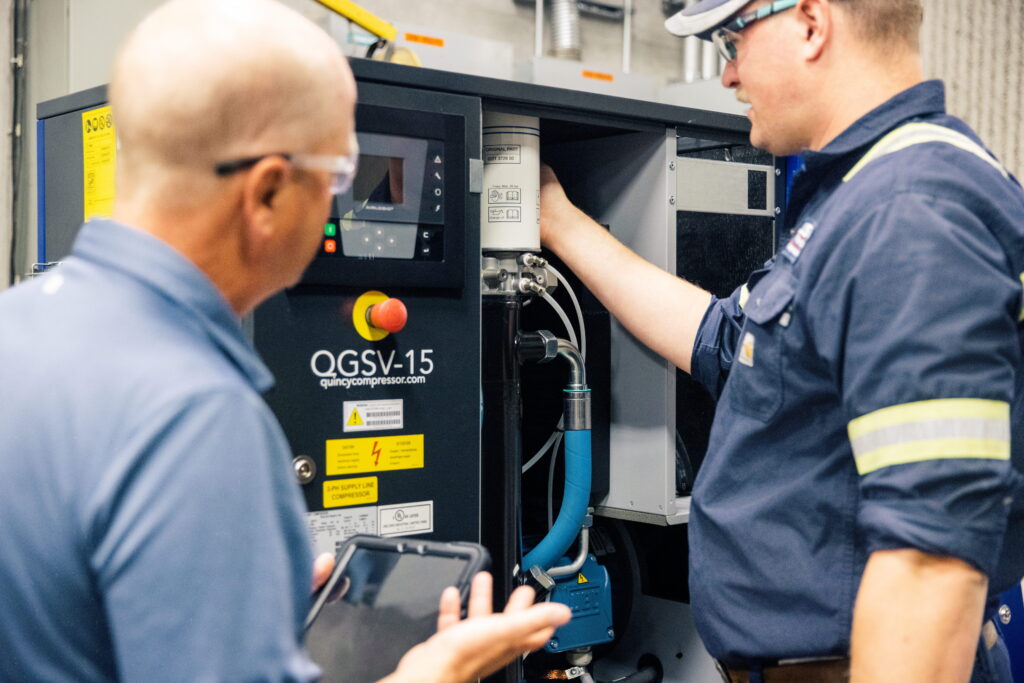Rotary Screw Compressor Maintenance: Maximize Reliability and Lifespan
Rotary screw air compressors are known for durability and a 10- to 20-year service life, but proper maintenance is key to achieving maximum uptime and a long life expectancy from your unit. Protect your investment and secure the reliability of your 24/7 operations with rotary screw air compressor maintenance advice from JHFOSTER air compression experts who are backed by years of experience selling and supporting rotary screw technology.

Essential Maintenance Tasks and Schedules
The most common maintenance tasks for rotary screw air compressors include oil management, filter changes, heat exchanger, and belt and coupling checks.
Oil/Lubricant Management
Be sure to follow the recommendations found in your manual regarding the best compressor oil for your rotary screw compressor.
Rotary screw compressor oil changes are typically performed every 4,000 to 8,000 hours of operation, depending on the oil type and operating environment. Again, be sure to check the manual for the manufacturer’s recommendations for your specific compressor.
Routine replacement of oil filters and air/oil separator elements is also required to maintain air quality and efficiency.
Oil sample testing should be performed periodically to ensure the health of your compressor. Oil testing serves as a check-up for the health of your compressor.
Air Filter Replacement
Routine air filter replacement is essential for protecting the air end from contaminants and ensuring the longevity of your unit, the quality of your compressed air and system efficiency. Clogged filters cause pressure drop, which reduces system efficiency, drives up energy bills and forces the compressor to work harder, increasing wear and tear on the unit.
Belt and Coupling Checks
Regularly inspect belts for cracks, damage and wear and ensure proper tension. Check couplings for signs of wear, damage or loose fasteners and make sure couplings are properly aligned. This ensures optimal drive performance.
Life Expectancy and Running Conditions
You’ve got questions about the lifespan and running conditions of rotary screw compressors? JHFOSTER air compression experts have answers.
What is the life expectancy of a rotary screw air compressor?
With proper maintenance, you can expect your rotary screw air compressor to last 10 to 20 years, or over 40,000 hours, providing an optimal return on your investment.
Do rotary screw compressors run constantly?
Yes, rotary screw compressors are designed for 100% duty cycle, but this necessitates strict adherence to the manufacturer’s recommended maintenance schedule.
Can I service my screw compressor?
Yes, you can service a rotary screw compressor when performing general maintenance such as changing filters, separator elements and oil. However, specialized expertise is required for complex services such as air end rebuilds or VSD controllers.
Troubleshooting Rotary Screw Compressors and Preventing Common Faults
Common faults in screw compressors include high operating temperatures, pressure drops and excessive oil carryover. Most faults are preventable with proactive monitoring and proper maintenance.
A quick troubleshooting guide for common faults
- High operating temperatures may be caused by low oil, dirty heat exchangers, defective thermal valve or poor ventilation.
- Pressure drops are often the result of dirty filters, separators or system leaks.
- Excessive oil carryover can be due to too much oil, plugged scavenge system, or a failed separator element.
For troubleshooting expertise beyond this simple guide or to solve more complex problems, call on your air compression partner, JHFOSTER. Our technicians are trained and certified experts who can offer solutions that will keep your unit running reliably for years to come.
JHFOSTER: Your Compressed Air Partner
At JHFOSTER, we provide the necessary expertise to evaluate your air demand and ensure you invest in the best air compressor technology and the right maintenance strategy. Most of the compressed air systems we sell are rotary screw units, making us experts in the maintenance and service needed to maximize your asset’s lifespan and reliability.
Contact us today to speak with a compressed air expert about your current unit’s maintenance needs or to upgrade to a more efficient rotary screw system. We can perform an air audit to quantify your air needs, determine the best compressor size for your current and long-term requirements and help design a maintenance and service plan that will keep your compressor running well into the future.
